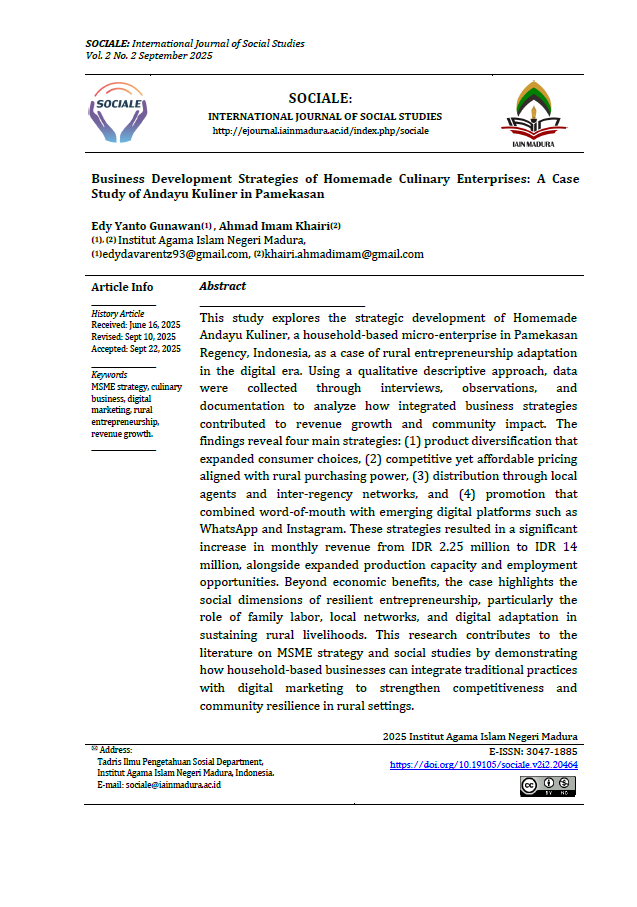Business Development Strategies of Homemade Culinary Enterprises: A Case Study of Andayu Kuliner in Pamekasan
 Abstract views: 173
,
Abstract views: 173
,
 PDF downloads: 93
PDF downloads: 93
Abstract
This study explores the strategic development of Homemade Andayu Kuliner, a household-based micro-enterprise in Pamekasan Regency, Indonesia, as a case of rural entrepreneurship adaptation in the digital era. Using a qualitative descriptive approach, data were collected through interviews, observations, and documentation to analyze how integrated business strategies contributed to revenue growth and community impact. The findings reveal four main strategies: (1) product diversification that expanded consumer choices, (2) competitive yet affordable pricing aligned with rural purchasing power, (3) distribution through local agents and inter-regency networks, and (4) promotion that combined word-of-mouth with emerging digital platforms such as WhatsApp and Instagram. These strategies resulted in a significant increase in monthly revenue from IDR 2.25 million to IDR 14 million, alongside expanded production capacity and employment opportunities. Beyond economic benefits, the case highlights the social dimensions of resilient entrepreneurship, particularly the role of family labor, local networks, and digital adaptation in sustaining rural livelihoods. This research contributes to the literature on MSME strategy and social studies by demonstrating how household-based businesses can integrate traditional practices with digital marketing to strengthen competitiveness and community resilience in rural settings.
Downloads
References
Abdussamad, Z. (2021). Metode Penelitian Kualitatif. Makassar: Syakir Media Press.
Agustina Shinta. (2011). Manajemen Pemasaran (A. Mansur & Salman Alfarisi (eds.); Pertama). Universitas Brawijaya Press.
Brykman, K., Newman, A., Backmann, J., Hartmann, S., & Pidduck, R. (2022). Psychological resilience of entrepreneurs: A review and agenda for future research. Journal of Small Business Management, 60, 1041–1079. https://doi.org/10.1080/00472778.2021.2024216
Creswell, J. W., & Creswell, J. D. (2018). Mixed Methods Procedures. In Research Defign: Qualitative, Quantitative, and Mixed M ethods Approaches.
Da Silva Santos, K., Ribeiro, M., De Queiroga, D. E. U., Da Silva, I. A. P., & Ferreira, S. (2020). The use of multiple triangulations as a validation strategy in a qualitative study. Ciencia & Saude Coletiva, 25 2, 655–664. https://doi.org/10.1590/1413-81232020252.12302018
Ernawati Waridah. (2017). Kamus Bahasa Indonesia (Pertama). PT.KAWAHMedia.
Fadilah, A., Syahidah, A. nur’azmi, Risqiana, A., Nurmaulida, A. sofa, Masfupah, D. D., & Arumsari, C. (2021). Pengembangan Usaha Mikro, Kecil, Dan Menengah Melalui Fasilitasi Pihak Eksternal Dan Potensi Internal. BERNAS: Jurnal Pengabdian Kepada Masyarakat, 2(4), 892–896. https://doi.org/10.31949/jb.v2i4.1525
Fauzia, I. Y., & Abdul Kadir Riyandi. (2014). PRINSIP DASAR EKONOMI ISLAM PERSPEKTIF MAQASHID AL- SYARI’AH (pertama). KENCANA.
Gu, X., & Koren, Y. (2022). Mass-Individualisation – the twenty first century manufacturing paradigm. International Journal of Production Research, 60, 7572–7587. https://doi.org/10.1080/00207543.2021.2013565
Hartanto, S., & Sup, D. F. A. (2022). The Concept of Production and Environment in the Perspective of Islamic Economic. Journal of Economicate Studies. https://doi.org/10.32506/joes.v5i2.705
Kusyk, N. (2020). THEORETICAL AND METHODOLOGICAL ASPECTS OF FORMING STRATEGY FOR SUSTAINABLE ECONOMIC DEVELOPMENT OF SMALL BUSINESSES. https://consensus.app/papers/theoretical-and-methodological-aspects-of-forming-kusyk/23410cc07ace503387b90f5603130728/
Loso, Judi janto, Junaidi Abdillah, D. (2024). Akuntansi untuk UMKM (Yayan Agusdi (ed.); Pertama). PT Soud Pedia Publishing Indonesia.
Mutia Arda, Gustina Siregar, D. (2022). Kewirausahaan Buku Ajar Bagi Mahasiswa (Mohammad Arifin (ed.); Pertama). Umsu Press.
Pantri Heriyati. (2022). Strategi Pemasaran Segmenting, Targeting dan Positioning (Pantri Heriyati (ed.); Pertama). Scopindo Media Pustaka.
Prayogi, P. R., Hasbullah, H., Haekal, J., & Eko, A. (2021). BUSINESS DEVELOPMENT STRATEGY USING SWOT ANALYSIS METHOD IN CULINARY INDUSTRY. 2, 53–61. https://doi.org/10.7777/JIEMAR.V2I3.146
Rachmad, yoesoep E., & Zunan Setiawan, D. (2023). Manajemen Pemasaran Teori dan Studi Kasus (S. Efitra (ed.); Pertama). PT SOUNDPEDIA PUBLISHING INDONESIA.
Ray, S. (2021). Choice of Inputs and Outputs for Production Analysis. Handbook of Production Economics. https://doi.org/10.1007/978-981-10-3450-3_20-1
Rosinawati, D., Khoirurrahman, A., & Sauri, S. (2021). Eduvis : Jurnal Manajemen Pendidikan Islam Kepemimpinan Kewirausahaan di Bidang Pendidikan. Eduvis: Jurnal Manajemen Pendidikan Islam, 6(2), 159–171.
Safrudin, A. H. (2020). Studi Ma’āni Al-Hadist Terhadap Hadis-Hadis Keuntungan Jual Beli. SALIMIYA: Jurnal Studi Ilmu Keagamaan Islam, 1(3), 221–248.
Skokan, K., Pawliczek, A., & Piszczur, R. (2013). Strategic Planning and Business Performance of Micro, Small and Medium-Sized Enterprises. Journal of Cryptology, 5, 57–72. https://doi.org/10.7441/JOC.2013.04.04
Snihur, Y., Reiche, B., & Quintane, E. (2017). Sustaining Actor Engagement During the Opportunity Development Process. Strategic Entrepreneurship Journal, 11, 1–17. https://doi.org/10.1002/SEJ.1233
Surachman, A. E., Jannah, F. U. N., & Anindita, A. (2025). Penerapan Analisis Titik Impas Sebagai Dasar Perencanaan Laba Di Pt Indofood CBP Sukses Makmur Tbk. Jurnal Akuntansi, Manajemen, Bisnis Dan Teknologi. https://doi.org/10.56870/cs6fac13
Wahid, A. (2025). Wawancara.










